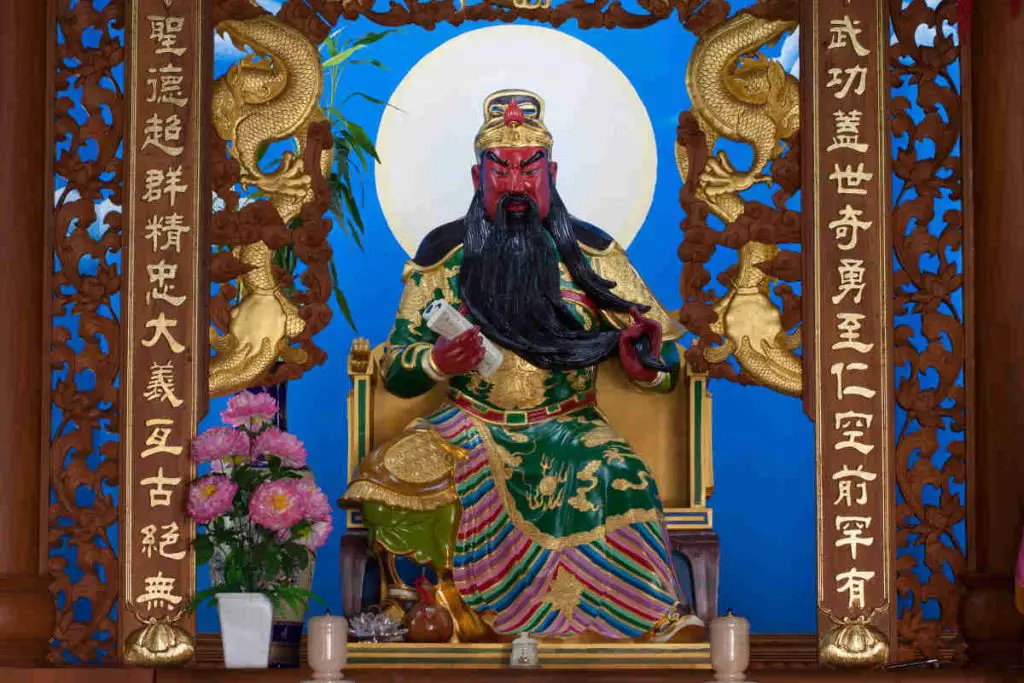
Caishen (财神), also known as Tsai Shen Yeh (財神), is the Chinese god of wealth and money. In China, he is worshiped by adherents of both Taoism and Chinese folk religions.
He rules over a vast number of minor deities. Often depicted as a majestic figure dressed in exquisite silks and mounting a black tiger while carrying a club with the power to transform common stone and iron into gold.
The name Cai Shen was created by combining two separate characters: Cái (財), which denotes wealth or money, and Shén (神), which denotes god or deity. When you combine the two, you get “Cai Shen,” or the god of wealth.
Caishen is regarded as the most powerful god. According to one tale, Buddha appointed Caishen the supreme king of wealth and good fortune. As such, he has the power to bestow good fortune and wealth on anyone he wishes while taking wealth away from those who do not deserve it.
He is also known as the Chinese alchemist because he is said to be capable of transforming iron, stone, and lead into pure gold. Cai Shen is frequently depicted in artwork with a large number of servants carrying objects that denote prosperity, such as gold ingots, fruits, etc.
Throughout Chinese history, the deity of wealth has incarnated at least nine times, each expressing a different part of Cashien’s nature. Most of the time, he was seen taking the form of important political and military figures. This was because, with his vast knowledge and wealth, he was able to help with or suggest advanced political moves.
As we will see below, Cashien’s reincarnations use their abilities to bless or curse others’ prosperity.
As a respected god of wealth, Caishen is revered during Chinese New Year and utilized in feng shui to attract wealth.
Let’s find out some of the most famous legends about Caishen, his role in the Chinese New Year celebration, and how to use his symbol in feng shui to attract wealth.
Caishen in Chinese mythology
Caishen, like many other gods and spirits in Taoism, Buddhism, and Chinese folk religion, is not a single person. Instead, he is a virtue and a divinity who lives through individuals and heroes of many periods. As a result, Caishen has lived many lives, died many times, and had countless stories written about him, frequently from diverse and contradictory sources.
He was said to have incarnated as a few historical personalities over the years. Caishen was able to use his vast wealth to accomplish political objectives by appearing as an important military or political figure.
Every area in China has a unique origin story for Caishen. While the most prominent version places him in the semi-mythical Shang Dynasty, legends about Caishen’s human existence take many different shapes.
Some think that the deity of riches was reincarnated to serve more people. Others, on the other hand, believe that the god’s ambiguous beginnings ensure that no single location has a stronger claim to wealth than another.
As a result, his human beginnings are so diverse that there is a distinct aspect of the god of wealth for each of the nine directions! Here are some of his most popular incarnations.
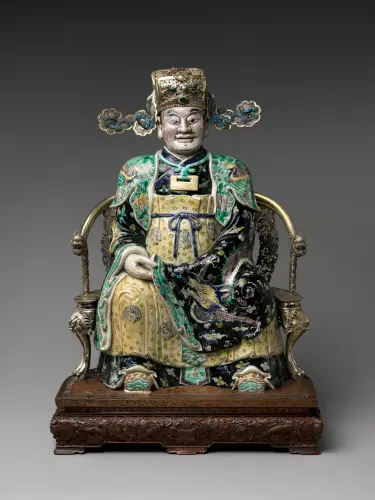
Caishen as Bi Gan 比干
Caishen’s first incarnation was said to be as a royal counselor named Bi Gan (比干) during the early Shang Dynasty. He was the son of King Wen Ding and a sage who counseled the monarch on how to run the realm most effectively.
He was married to a woman with the surname Chen and had a son called Quan, according to legend.
Despite being the King’s son, it was Bi Gan’s nephew, Zhou Xin, who sat on the throne. Although the new monarch was intelligent, he was also short-tempered. He became infamous for his debauchery and the violence with which he treated anyone who disagreed with him. Di Xin eventually killed his own uncle because he was getting tired of listening to Bi Gan’s wise counsel on how to manage the nation.
Di Xin used an “extraction of the heart” to execute Bi Gan. The monarch was curious to know if the ancient proverb that “Sage’s heart has seven openings” was indeed accurate, so he had his heart removed. Bi Gan’s wife and son were able to flee into the woods and survive.
However, the execution of Bi Gan signaled the beginning of the end of King Zhou’s reign and the Shang Dynasty. King Wu, the first king of the Zhou Dynasty, soon overthrew him. King Wu honored the surviving members of Bi Gan’s family. Quan, Bi Gan’s son, was given the name Lin, which means “Forest,” and all Lins today are his direct descendants.
✅Interesting fact: Lin is the 18th most popular family name in mainland China. Lin and its derivatives are also commonly used in Korea, Vietnam, Thailand, Singapore, and the Philippines. The same characters are used in Japan to write the country’s 19th most frequent name. The Lin family has about 20 million members in mainland China alone.
Bi Gan is one of the most well-known manifestations of the Chinese deity of wealth. This myth eventually became a prominent plot element in the philosophical discussion concerning China’s Warring States. Confucius also referred to Bi Gan as “one of Shang’s three men of virtue.” Following that, Bi Gan was respected as one of Caishen’s manifestations. In addition, he gained popularity because of the well-known Ming dynasty book Investiture of the Gods (Fengshen Yanyi).
Caishen as Caibo Xingjun
According to another legend, Caishen, under the name Caibo Xingjun, was once a rural magistrate named Li Guizu. Li was born in the Chinese province of Shandong, in the district of Zichuan. Li was able to make significant contributions to the district’s well-being from his position. People loved him so much that after his passing, they even constructed a temple to worship him.
The Tang dynasty’s Emperor Wude gave the late Li the name Caibo Xingjun. He was then regarded as another manifestation of Caishen.
Caishen as Zhao Gong Ming 赵公明
The novel Fengshen Yanyi, which was published during the Ming dynasty, contains another tale of how he came to be worshipped as a god. In the book, a hermit by the name of Zhao Gong Ming allegedly utilized his magical abilities to save the Shang Dynasty, which was on the edge of extinction in the 12th century BC.
However, a man named Jiang Ziya, who supported the rival Zhou dynasty, intended to stop Zhao’s efforts and let the Shang dynasty fall. Therefore, he created a straw effigy of Zhao Gong Ming and spent twenty days reciting spells over it in an effort to connect it to Zhao’s spirit. Jiang eventually succeeded, and he stabbed the effigy’s heart with an arrow made of sacred peach tree wood.
Zhao grew sick and died soon after Jiang did this. Later, on a visit to Yuan Shi’s temple, Jiang received a rebuke for killing a righteous man. Ziya was obliged to bring Gongming’s body to Yuan Shi’s temple and repent of his crime.
He took the corpse inside the temple, apologized for his mistake, exalted Zhao’s merits, declared Zhao an incarnation of Caishen, god of wealth, and appointed him head of the “Ministry of Wealth“.
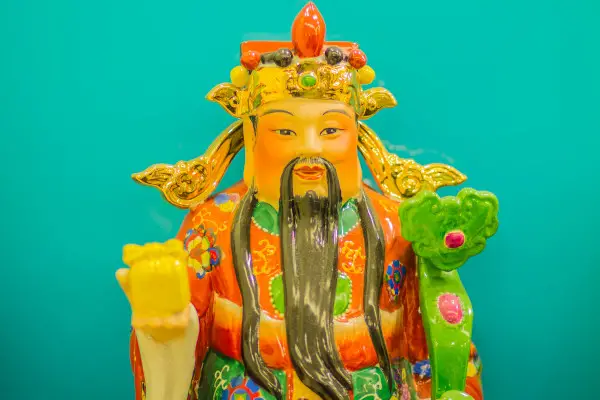
Caishen as Fan Li 范蠡
Caishen was linked to the military strategist and businessman Fan Li during Confucius’s time. Fan Li served as King Goujian of Yue’s counselor.
While Goujian was in power, the hostile state of Wu took hostage Fan Li and the monarch and imprisoned them for three years. Following their enslavement, Fan Li dutifully served Goujian, conducting reforms and governmental appointments that considerably benefited the Yue state.
As a result of Fan Li’s reforms, Goujian was able to overthrow the Wu government in 493 BC. Following his triumph, Fan Li resigned from his position and changed his name to Tao Zhu Gong.
After Fan Li retired, he and his wife, Xi Shi, one of China’s Four Beauties, lived on a small fishing boat on Lake Tai. Fan Li was soon seen as the reincarnation of Caishen because of his success in business and the many good changes he made to the government.
Caishen as Li Guizi
Stories of Li Guizu began to emerge in the 300 years between 618 and 907, during the Tang Dynasty. Li Guizu was a country magistrate who was born in the Zichaun region of Shangdon Province.
During his administration, he brought immense riches to the region with his innovative laws, establishing the district as one of the richest in the Empire.
Following his death, the people raised a temple in his honor and started worshiping him as a divinity. Soon after, the Wude Emperor declared Li Guizu a god of wealth, eternally tying him to Caishen mythology.
Other Names of Caishen
The historical and mythological characters mentioned above are only a few of the numerous people thought to be Caishen manifestations. Different areas of China refer to Caishen with different titles that represent different things, however, all of his names are means of drawing wealth.
Additionally, these Caishen incarnations are associated with various directions. So, if you need Caishen’s help, you should choose one of these nine Caishen. These names are:
According to the 5 Primary Directions
| Name | Meaning | Direction | Element |
|---|---|---|---|
| Zhao Gong Ming (赵公明) | ‘Military God of Wealth’ | Center | Earth |
| Xiao Sheng (萧升) | ‘God of Collecting Treasures’ | East | Wood |
| Cao Bao (曹宝) | ‘God of Collecting valuables’ | West | Metal |
| Yao Shao Si (姚少司) | ‘God of Profitability’ | North | Water |
| Chen Jiu Gong (陈九公) | ‘God of Attracting Wealth’ | South | Fire |
According to the 4 Additional Directions
| Name | Meaning | Direction |
|---|---|---|
| Shen Wanshan (沈万山) | ‘God of Gold’ | North-East |
| Han Xin Ye (韩信爷) | ‘The God of Gambling’ | South-East |
| Tao Zhu Gong(陶朱公) | ‘Civil God of Wealth’ | North-West |
| Liu Hai (刘海) | ‘The God of Luck’ | South-West |
These nine incarnations include everything you may earn from, luck, money, gambling, gold, and so on.
Each version of Caishen’s narrative takes place in a different location. This is not uncommon among Chinese gods, and the gods’ traditional dwellings are regarded as the most sacred as the basis of their worship.
Nonetheless, every region had an inherent interest in attracting the special attention of the deity of wealth. However, the name, which means “God of Wealth,” might be appropriately assigned to any god who presides over a similar realm.
Related Reading: “Sanxing” – The Trinity of Luck and Happiness in Chinese Culture and Feng Shui – Opens in new tab
Caishen in the Chinese New Year’s Celebration
Near the end of January, Chinese people will be very busy getting ready for the Chinese New Year (Spring Festival) and, most importantly, making sure their wishes are heard.
Caishen 财神 is the far more frequently invoked god than any other. It is said that calling on Caishen would help ensure prosperity in the following year.
During the two-week New Year’s celebration, incense is burned at Caishen’s temple, and the Chinese greet one another with a smile and the phrase, “May you become rich!” (恭喜发财 gōngxǐ fācái). This is sometimes misinterpreted as the Chinese version of “Happy New Year.” In reality, it is a prayer for prosperity in the coming year.
The best time to get a Caishen blessing is usually New Year’s Eve.
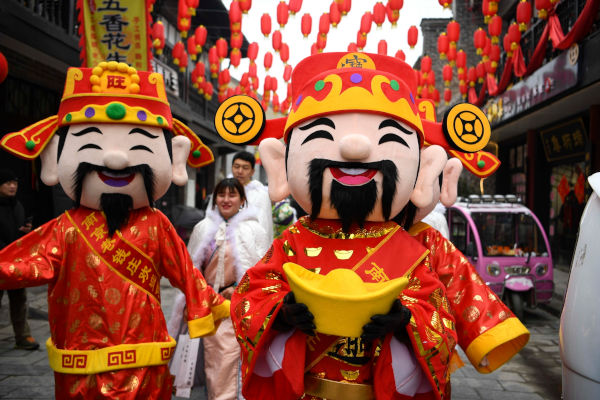
Preparation and a Simple Ceremony to Receive Caishen Blessings
There are several preparations that must be made before inviting the deity of prosperity into one’s house. The home must be cleaned in advance, with windows and doors fixed and the main door adequately illuminated.
One must also dress appropriately for the occasion and organize the ceremony itself in order to invite the god of wealth. It is important to meet the God of Wealth with a clean body and clean clothes. It is to demonstrate your respect for the deity. So, you should go take a shower to clean yourself.
This simple ceremony might help you overcome bad luck and bring good fortune. But, if you want you can find more advanced ceremonies on the web. You should be ready for the ceremony before midnight:
- Light the two red candles (which represent happiness) and put three lighted joss sticks of your choice incense into the incense burner.
- Allow Caishen to enter your house and bring the auspicious chi with him by turning on all of the lights and opening all of the doors and windows in the house.
- Welcome the God of Wealth, either outside the main door, on the balcony, or staring out the open window.
- To invite the God of Wealth to your home, recite “God of Wealth, come enter my house” while imagining the God of Wealth entering your home.
- Bow three times, as if meeting Caishen.
- If you like, you can say your wish or mantra three times. You’ll need to visualize what you desire in terms of wealth. Since this is an exchange of energy, you should also say what you will do to make your wish come true.
- The god of wealth has now entered your house; therefore, you can close the windows and doors to symbolize this.
- Some people also make a feast on New Year’s Eve to share with the god of wealth. They place him at the head of the table at which they and their friends and family will dine to celebrate the Chinese New Year.
Check out our “Free Chinese Literature Library”. We have compiled some great free resources, about Chinese literature, for your research.
Symbolism of Caishen
When you look at Caishen’s many personifications, it’s easy to see what he represents. Caishen has always been a knowledgeable sage who knows people, the economy, and the fundamental principles of good administration. And in every one of his lives, he makes use of his skills to benefit others around him, whether it is by giving wise counsel or personally exercising leadership.
As a man, he inevitably passes away in some way—sometimes gently from old age, sometimes through the enmity and pride of others. The later stories are much more significant, as they demonstrate how many individuals are too arrogant to allow others to be admired.
Notably, whenever an incarnation of Caishen is killed, the province or dynasty collapses following his passing, but whenever Caishen passes away from old age, the people who come after him flourish.
While Caishen can assist individuals with attracting money, the tiger he rides may represent that more work is required to guarantee financial prosperity.
In Chinese art, tigers represent a variety of traits and ideals. Persistence is one of them.
Caishen may provide the favor of prosperity, but by riding a tiger, he demonstrates that a deity alone cannot bring such fortune. In order to attract wealth in the New Year and beyond, perseverance, effort, and hard work are just as crucial as Caishen’s invocation.
So, his symbolism demonstrates that invoking the deity is not sufficient to attract wealth.
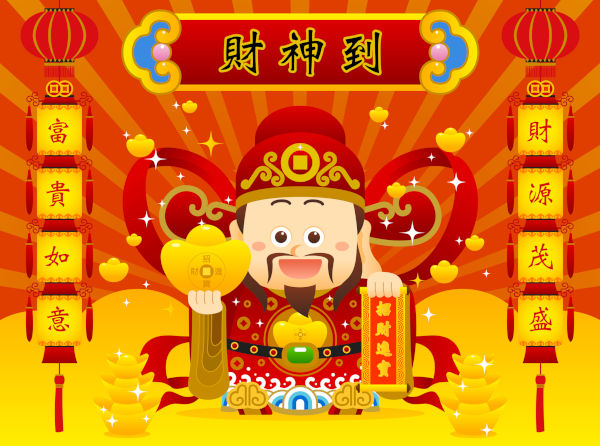
The Worship of Caishen in China
During the early days of communist power in China, Mao Tse Tung’s new Chinese government aimed to eradicate the people’s need for gods. One of the government’s main targets was the deity Cashien, and temples all around China were demolished and destroyed.
However, with the reform and opening up that occurred in 1979 and thereafter, mainland Chinese came into contact with the “Four Asian Tigers” — the overseas Chinese populations of Taiwan, Hong Kong, Singapore, and South Korea. Caishen had been kept alive there, and they had become wealthy and advanced. The Chinese people, fearful of being cursed for leaving the god of wealth, immediately returned to Cashien worship.
In a short period of time, temples dedicated to the Chinese god of wealth were rebuilt all throughout the nation. Shrines and sculptures sprang up suddenly, and in the early 2000s, the biggest Caishen temple was erected and dedicated in Xi’an, Shaanxi.
During China’s two-week New Year festival, the fifth day of the first lunar month is devoted to Caishen, a deity so beloved that even Mao Tse Tung’s regime could not remove him. In Caishen’s temples, incense is burned, and (as previously said), strangers and friends share the traditional salutation “gōngxǐ fācái” (恭喜发财) “May you become rich!”
Caishen is more than just the god of wealth. His followers believe that he is the most powerful god in China. Having faith in Cashien’s ability to bestow followers with wealth and success is recognized in Chinese folk mythology as well as both Taoist and Buddhist religions. The legendary tales of Cashien have been told for more than 3,000 years, and they don’t seem to be going away anytime soon.
Check out our “Free Culture Library“. We have compiled some great free resources, about Chinese culture, for your research.
How to Use Caishen, the Chinese God of Wealth, in Feng Shui
Images of Cai Shen, a god of wealth, are commonly displayed as part of feng shui practices in order to bring financial success and happiness. It is thought that if you display an image of Caishen, the god of wealth, at your house or place of business, you will experience an unexpected flow of money and the benefits of good financial fortune.
Depiction of God of Wealth
Caishen is usually seen riding or sitting on a black tiger, carrying a Ru Yi scepter in one hand and a gold ingot (元宝 yuánbǎo) in the other. In other portrayals, he is also portrayed carrying an iron, which has the ability to convert iron and stone into gold.
Caishen is also shown as pleasant and friendly, frequently wearing the traditionally ornamented red robes of a government servant with a minister’s hat. As the Chinese god of wealth, Caishen is followed by a large group of servants who carry gold ingots, significant scrolls with royal orders, fruits, and delicious foods.
As we’ve already said, Caishen stands for the assurance of wealth, while the tiger stands for persistence and hard work. So, when Caishen rides the tiger, the lesson is that relying only on the gods will not ensure success. Rather, the gods reward those who are hardworking and persistent.
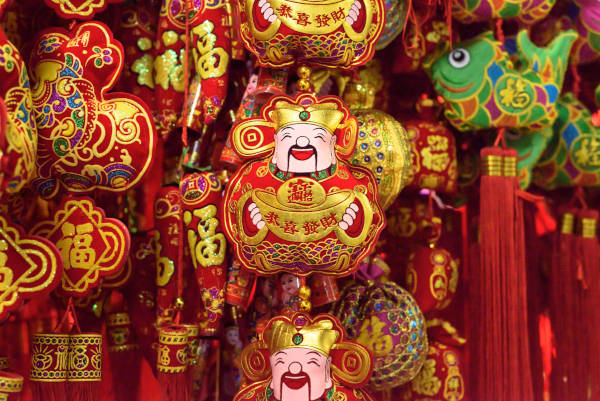
Caishen Feng Shui Placement Guidelines
Activate Your Home’s Wealth Sector
You can display a figure, picture, or wall hanging of the god of wealth in your home’s southeast (wealth) sector. If you choose to activate the wood element that regulates the southeast sector, you can select a wood element.
Boost the Career Sector
You could also put a figure of Caishen in your office to help your business. The optimal location is elevated and, ideally, immediately behind where you work. You would like the god of wealth to watch over you and protect your career. Having the god of money on your side can help you climb the business ladder to higher levels of responsibility and power.
Place Caishen in Your Personal Wealth Direction
Caishen might be placed in the direction of your personal wealth. This is your Sheng Chi direction, which is based on your Kua number. You may identify your four best directions, including your Sheng Chi direction, by calculating your Kua number.
More Tips for Caishen Placement
- Once you have placed the statue or artwork, keep it clean and in good shape to make sure that your good fortune continues.
- The higher you place Caishen, the more you value him and the greater wealth you will have.
- Caishen should never be placed on the ground or lower than eye level, since doing so is disrespectful.
- Put Caishen, the god of wealth, in your living room or entrance.
- Caishen should never be kept in the bathroom, bedroom, laundry room, kitchen, cellar, or loft.
🍀 Our “Feng Shui Master” app is your trusted companion, offering a useful guide to implementing Feng Shui principles. Try it now!
End Words
Finally, Caishen, the Chinese god of wealth and fortune, is very important in Chinese culture. Caishen is considered the most powerful of gods by Taoists and Chinese folk religions and is said to have the capacity to bestow good fortune and prosperity on those he favors.
Caishen, who has had several incarnations throughout history and a variety of origin stories, is revered during the Chinese New Year festivities and has come to represent wealth. Many traditions and preparations are done to invite his blessings into homes in the hope of having a good year ahead.
While Caishen’s symbolism indicates knowledge and wisdom, it also highlights the significance of perseverance, effort, and hard work in obtaining financial success. Caishen worship continues to play an important part in China’s cultural practices and ideas about wealth and abundance.
Want to learn more about Feng Shui? Check out our suggestions: Feng Shui Bookshelf – Opens in new tab
Stay in Touch
 Join our newsletter by using the forms on this website or click here!
Join our newsletter by using the forms on this website or click here! Follow us on Google News
Follow us on Google News Follow us on Facebook
Follow us on Facebook
Feature Image from Depositphotos




